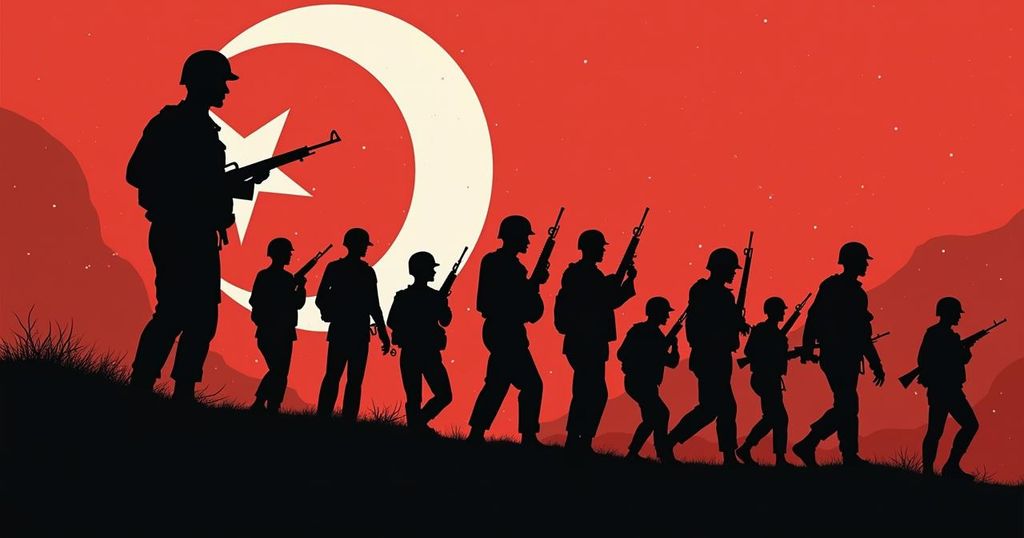The Tunisian army has gained unprecedented political influence under President Kais Saied, shifting from a historically marginalized institution to one with significant governmental roles. This evolution raises concerns ahead of the upcoming presidential election, which many perceive as lacking fairness. The military’s increased involvement in governance, coupled with its established role as a protector of democracy post-revolution, complicates the political landscape, posing questions about the sustainability of Tunisia’s democratic progress.
In recent years, the Tunisian army has experienced a notable increase in its political influence, particularly following President Kais Saied’s ascent to power. After decades of marginalization under previous leaders such as Habib Bourguiba and Zine el-Abidine Ben Ali, the military began to regain prominence during the 2011 revolution, emerging as a perceived defender of democracy. This revival of respect has allowed President Saied to cultivate a strong relationship with the military, which has bolstered his authority, particularly during his controversial power consolidation in July 2021. Since taking office in 2019, President Saied has actively sought to align the military with his political agenda, marking a departure from Tunisia’s historical precedent of keeping soldiers out of political affairs. This shift has included unprecedented appointments of military figures to critical ministerial roles, a decision that raises concerns among observers regarding the army’s increasing involvement in governance, especially in light of the forthcoming presidential election, which has been widely criticized as lacking fairness. Contrasting sharply with military roles in neighboring countries, the Tunisian military has traditionally been relegated to a non-political status since the era of Bourguiba, who believed that soldiers should not engage in political processes. This mindset persisted under Ben Ali, who perceived the military as a potential threat. However, the post-revolution period saw a renaissance for the military, recognized not only for its role in maintaining security but also as a supporter of democratic processes, including election oversight and logistics. The army’s recent centralization of power coincided with significant threats from terrorism, particularly attacks between 2011 and 2016 that heightened its prominence in public life. With increasing budgets and Western military aid, particularly from the United States, the military has grown both in capability and public esteem. In the current political landscape, President Saied has engaged in behaviors indicative of courting military support, utilizing its resources to suppress dissent and consolidate power. His declaration of leadership over both civilian and military forces prior to his political maneuvers in July 2021 exemplifies his reliance on military cooperation. However, friction has emerged, as seen with the recent cabinet reshuffles and reports of dissent from military personnel regarding Saied’s political decisions. As the presidential election on October 6 approaches, questions arise about the military’s potential role and responsibilities in upholding democratic principles, especially given allegations of electoral manipulation. The evolving relationship between the military and political leadership will be crucial in determining Tunisia’s democratic trajectory moving forward.
This article examines the increasing role of the Tunisian army in the political sphere under President Kais Saied, especially in the period leading up to an anticipated presidential election. Historically, Tunisia’s military has been characterized by a non-political stance, particularly under the leadership of Habib Bourguiba and Zine el-Abidine Ben Ali, who prioritized limiting military influence in governance. However, changes following the 2011 revolution reshaped perceptions of the military, positioning it as a facilitator of democracy. This article elucidates how this perception has shifted again with President Saied’s administration, raising critical concerns about the implications of military involvement in civilian governance during an election cycle questioned for its legitimacy.
The Tunisian army’s enhanced political role under President Saied poses significant implications for the country’s future. As the military emerges as a key player in the governance landscape, its involvement raises concerns about the fragility of Tunisia’s democracy and the potential for a return to more authoritarian governance practices. The upcoming presidential election serves as a critical juncture for understanding the balance of power between military influence and democratic principles.
Original Source: www.middleeasteye.net






